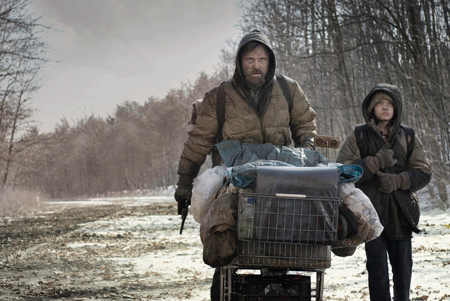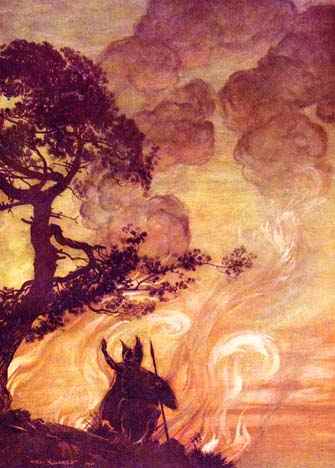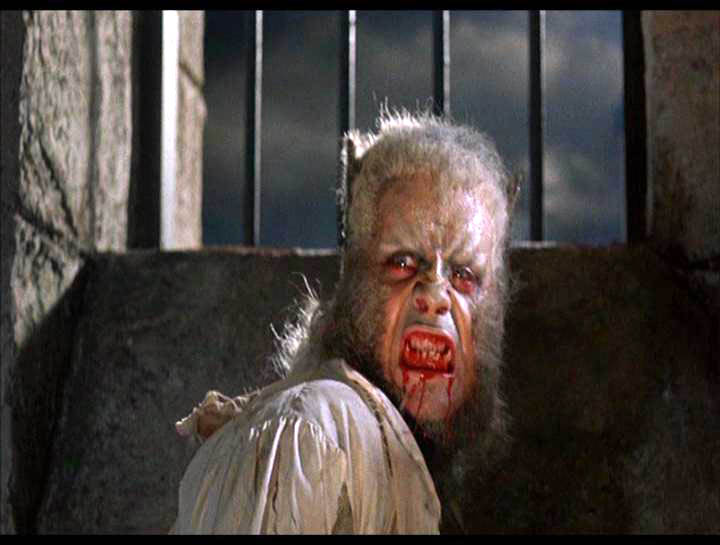[meant to post this a while back, when I was fresh from the theater last week, but now, having just rewatched
Dog Soldiers, can't help but be reminded, by contrast, of what left me cold, high, and dry with
Wolfman...]

The new Benicio Del Toro
The Wolfman reload: Burton's
Sleepy Hollow plus William Morris wallpaper plus working through your Daddy issues via furry, cuddly, bloody wolf-on-wolf action.
It's a resolutely awful film, which isn't to say that it has nothing to enjoy looking at. (See here: said wallpaper, a very pretty decaying mansion, Hugo Weaving's facial expressions, decently unsexy lycanthropic transformations.) But above all, it just isn't much fun at all. It feels dry and joyless, both hurried
and bored, always in a rush to get to the next thing, even if that next thing is more of the rushed same. And nowhere more so than the moments of intended fever pitch: when it's busy depicting what should be the bloodbath's ecstasy, it's a yawn of the utterly perfunctory.
Even the throwback movie monster howl at the moon - an act the film uses to keep signaling its Old School cred, even as it can't commit - becomes the occasion for eye-rolling. As it should be, but this is wrong kind of roll, not the kind accompanied by the creeping smile of collective movie-going involvement which always exceeds the disavowal of cheesiness. That's to say, we shouldn't assume that the sense of earlier monster films as laughable is just a product of our being hardened, post-
Hostel blood-waders: it's there from the start. And with it, that double mechanism, where your eyes don't just roll away from the screen (
oh, give me a break) toward cellphone or watch but toward your fellow watcher, the opportunity to share in the act (
oh, give me a break, and don't we love it anyway?).
As always, the mediocrity of one film or another isn't particularly compelling. To be sure, there are concrete reasons why it doesn't entertain, the usual suspects of what we often can't put our finger on, but which dictate the real phenomenal experience of watching: the sequencing, editing, making-rhythmic of it just doesn't work. (Among many things Eisenstein was right about, perhaps none more than this: if it doesn't click and clatter right, we never get into it. And if it doesn't halt and jerk forward
wrongly enough, we also don't feel it, caught in a dead zone of uninvolved but unreflective.) And moreover, there's a number of things
The Wolfman does that feel repetitive, which makes a relatively short film (102 min.) feel much longer, not just internally repetitive -
watch him bone-stretch heel-jut transform again! watch Emily Blunt act fragile again! watch foreshadowing of his father's possible lycanthropic involvement be made very obvious again! - but of other films, primarily other "reloads" of older horror traditions (i.e.
Sleepy Hollow,
Van Helsing).
But beyond the potential and probable ineptitude, three thoughts as to what produces the staleness of this "fresh new take."

1.
Gothic clutterMy friend Katie was on this as soon as we left the theater: "It's basically a Gothic novel proper." I think she's entirely right about this, as
The Wolfman captures two tendencies of the Gothic, back when it had little to do with Bauhaus and everything to do with very drawn out landscape descriptions. First, attention not just to setting but to non-action itself, to those descriptions which don't just call attention to "atmosphere" and "mood," but to the sheer duration of reading through them, which itself produces a world of non-intervention and witnessing. The act of sitting through
one more (castle, shadow that may indicate sinister goings-on, dirty family history, painting in which something is very wrong indeed, unswept floor, smell of crypt in the air) isn't a failure of the genre - it is the genre.
Second, a flurry of potential explanations or framing devices, none of which ever quite stick or are properly discounted, even as they are all mutually exclusive. (For example: in the Gothic, it isn't necessarily a trick of the eye
or a real ghost: what should be
either/or breaks down, and we're left with something closer to the
and/or with which I'm obviously fascinated.) If the honed edge of the murder mystery/detective novel is the fact of its narrowing, as red herrings are tossed out when discovered, in the Gothic, they remain part of the decoration of that world, its cluttered pleasure or claustrophobia. A longer question, to be raised unanswered here, is why this doesn't click right in
The Wolfman: has something of the historical grounding for the Gothic - not as content but as these organizations of
too much and the co-existence of what should be mutually exclusive - been lost, or rather, become unsettling?
2.
The time-lapse hustleThe Wolfman opens in a hurry: with the breathless toddler pacing of a "MTV editing" parody, it whips through, in about two minutes, a gravestone inscribed with the infamous "even those pure of heart" werewolf poem, establishment of locale, the gory death of Larry's brother, the grieving widow, the return of Larry, and the general sense that ill-deeds are at hand. This doesn't let up, and the insistent use of sped-up/time-lapse effects only heighten this impatience. We're both asked to get into the vibe of misty forest, ground-into-centuries custom, ancient evil and the slow death of the aristocracy, and demanded that we get that by watching the time-advanced arc of a full-moon across the sky while clouds whip across the screen. It's assumed that we're so used to the "point" of creepy dark woods that it takes three shots in four seconds total to put us there.
This isn't to lament an absent cinema of slowness, not to ask that all decapitation have the pacing of Ozu or Tarr. One of the genuine pleasures of horror happens when it lets itself be what it wants to be all along, a stripped-down machine for the delivery of effects and affects. Because when it does that, it almost always "fails" in more compelling ways: by putting a premium on
occasions and
passages, when it urges toward an economy of getting us what we want, it does one of two things: 1) like the "original"
Universal monster movies, it knows that the production of that stripped-down pleasure requires a great deal that isn't stripped down, it requires the full drawn out minutes of wandering the forest, the full brunt of not-so-witty dialogue, all the taking your time that makes the sudden delivery of the promised laughter and jolt possible , and 2) like the odder instances of
giallo, Spanish horror, grindhouse, etc, the very attempt to be "minimal" and efficient produces an overburdened tension that relocates the emphasis on all that
isn't necessary, not on the kill sequences, but on the deep weirdness of what is supposed to be perfunctory and not-worth-noticing.
The Wolfman doesn't nail either tendency, nor does it move past them toward another kind of enjoyment: it can neither acknowledge itself as a scare-machine nor allow us the slow build-up, through supposed denial or through an understanding of its instrumental purpose, of all the background material that is what we really come to see.

3.
Making campy what is already camp
Barring the petty Freudianism of "Fear What is Within," the taglines for the film beat us over the head with the coding of the film as about a
legend:
"The Legend is Alive"
"When the moon is full, the legend comes to life"
"Ce n'était pas qu'une legende" ("It wasn't only a legend")
From the advertising start, then, the film stands on weird terrain: it's unable to either access this legend (there's a bit of "doth protest too much" in its insistence that the legend is indeed alive and well) or phenomenally outstrip it (through the boredom of the watching experience) and thereby pump some blood into the vacant heart.
The problem with all this is that it very much wants to be - or to play at being - an "old-fashioned" film, while it insists that we can't have those kind of films anymore. It wants to situate itself within the shared cultural legacy of another moment, another kind of watching, another mode of narrative that both hails to the category of
legend and accesses it only as
imitation. It's that same turn in
Van Helsing and
Sleepy Hollow: in declaring itself to be of "another time" (through its explicit selection of legendary/early cinema/folk
content, and the attempted tone of "not being so serious"), it insists on the inaccessibility of the
moves of that other time. But it doesn't give up on being "about" those kind of moves and movies. Even though sandwiched between
Matrix style wolf cage fights and time-lapse hallucination montage, we still get the iconic howl. In short, it does the work of declaring as "campy" things we already can only see as such.
Camp may always be in the "wrong" places, and following Sontag, perhaps you indeed "can't do camp on purpose," but the
The Wolfman didn't get the message. My question isn't whether or not you can "do it on purpose," or whether or not it's wrong to try and do so. Rather, it's to ask where the pleasure has gone, why the resurrection of the past becomes a yawn in the present, why we need to further distance ourselves - as if past a break that can't be mended - by enacting a willful return to what never went away, how the fur can fly and still leave us so unscathed.




























